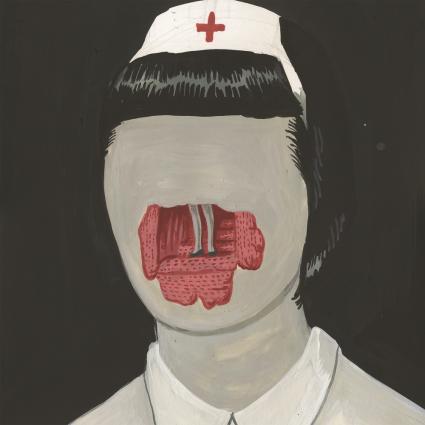Philly’s beloved Psychic Teens, who self-identify as “regular adults… that sound like that time you spotted your creepy metalhead brother at [an] 80s night,” have conjured a formidably impressive amount of buzz in response to their sophomore release COME (SRA Records). Plausibly picking up where TEEN left off, the band’s latest is a gloomier sequel to the moody anthems fans first heard in 2011.
“NO,” COME’s opener, unfolds with droning bass and screeching riffs, preceding eerie vocals that articulate “the sadness of expectation” and “decay.” Somewhere between King Dude and Peter Murphy, Larry Ragone’s distinctive diction grows melodically darker as the song endures, tying together nearly instrumental interludes with a harmonious chorus that crashes into buzzing chords and oscillating cymbals by the track’s end. With what feels like a swirling vision, “NO” fosters an audible landscape comprised of melancholic melodies reminiscent of My Bloody Valentine’s “When You Sleep” but darker and without the romance. The song’s outro reverberates, buzzing in listeners’ ears like the emotive residue of a bad dream. Awakening an appropriate sense of anxiety with “NO,” “RIP” continues the uneasy gloom of COME. With a similarly disorienting intro, “RIP” and its rapidity intensifies alongside the steady and subtly sardonic tone of Ragone’s vocals. As if channeling Ian Curtis’ ghost, the rhythm of this chant befittingly echoes Warsaw’s demos with a subdued energy. “H#TE” is sinister yet melodic with relatable lyricism that hums of depressive frustration. A mesh of post-punk, shoegaze, and the quintessential characteristics definitive of metal, “H#TE” is effectively poignant and perfectly placed before “LUST” which picks up soon after its prior’s abrupt end. Repetitive yet hypnotic riffs reverberate for the first half-minute and expand as the song endures. Feeling much like a trance, “LUST” audibly resembles the frustrated hunger of its namesake, playing out like a familiar dialogue between the self and its object of affection (or obsession). The album’s title track “COME” starts off with sparse instrumentation and vocals that sound out as if heard from another room. The distance between the track’s cyclical guitar lines and pulsating percussion gradually dissipates towards the climax of the song, during which Ragone’s recitation of “at the end of the world” serves as the preface to a tidal crash of guitar riffs and persistent cymbals. An appropriate title track, “COME” is a monolith, central to the album’s contextual and emotive structure. “LESS” is substantial with frenetic fretwork and plays out nearly orchestral. Its gradual buildup attributes a tangible velocity as the Psychic Teens approach full throttle towards its latter notes. Executed with delectable dread, “BUG” hums with a vigor that juxtaposes flawlessly with “VEIL” and its subsequent mellowed-out malaise.
Ending as dark as it started, COME’s final track marries the sinister croons of Danzig with the emotional excess and the poise of riffage reminiscent of “Degausser” (yeah, it’s okay, admit it… we all listened to Brand New at some point). Its final forty-five seconds serves as a perfected finale to Psychic Teens’ latest vision. As the cosmos spin around us, we can only predict that an equally monumental follow-up is yet to come.
